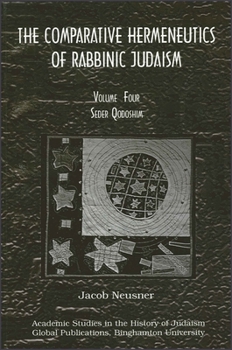The Comparative Hermeneutics of Rabbinic Judaism, Vol. 4
Hermeneutics, conventionally defined as "theory of interpretation," in Rabbinic Judaism finds its data in the modes of analytical thought that produce useful knowledge out of the facts deriving from three sources. These sources are 1] the Torah, Scripture and tradition, 2] nature, and 3] the social order constituted by holy Israel, the latter two as contemplated and classified to begin with by the Torah. These data require structure, proportion, order, balance and rationalization. What theory of interpretation identifies among those data points of likeness and contrast that define category-formations of cogency and proportion? That is the question I systematically answer, following the sequence of the Halakhic category-formations of the Mishnah-Tosefta-Yerushalmi-Bavli. Hermeneutics then articulates the results of a distinctive mode of thought, and, in the Halakhah, it is the analogical-contrastive kind. That is to say, analytical thought defining the category-formations that are subject to hermeneutical reflection proceeds in accord with the rules of analogical-contrastive thinking.
Format:Paperback
Language:English
ISBN:1586840134
ISBN13:9781586840136
Release Date:January 2000
Publisher:Distribution Partners
Length:535 Pages
Customer Reviews
0 rating





